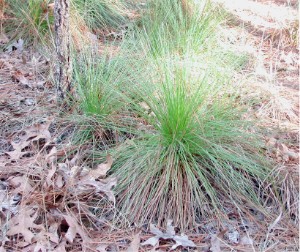Longleaf pine
(Redirected from Longleaf Pine)
Longleaf Pine (Pinus palustris) is a species of pine native to the southeastern United States, from eastern Texas to Florida, and north to southeastern Virginia. This tree is known for its long needles, which can be up to 18 inches in length, and for its large, robust cones. Longleaf pine forests are a critically important ecosystem, providing habitat for a wide variety of wildlife, including several endangered species. The longleaf pine ecosystem is one of the most biodiverse in North America, but it has been dramatically reduced in size due to logging, land conversion, and fire suppression.
Description[edit | edit source]
The Longleaf Pine can reach heights of 100 to 120 feet and a diameter of 2.5 feet. It has a straight trunk with a very high crown of foliage, making it a dominant tree in its ecosystem. The bark is thick, scaly, and reddish-brown. The long, slender needles are grouped in bundles of three and can be 8 to 18 inches long. The cones are also large, measuring 6 to 10 inches in length.
Ecology[edit | edit source]
Longleaf Pine forests are adapted to a fire ecology, with natural wildfires occurring every 1 to 10 years. These fires are essential for the regeneration of the species, as they clear out competing vegetation and release seeds from the cones. The Longleaf Pine is also known for its long lifespan, with some trees living over 300 years. This ecosystem supports a variety of plant and animal species, including the Red-cockaded Woodpecker, Gopher Tortoise, and numerous species of plants that are found nowhere else.
Conservation[edit | edit source]
The Longleaf Pine ecosystem has been reduced to less than 5% of its original area due to extensive logging in the 19th and 20th centuries, land conversion for agriculture and urban development, and suppression of natural fires. Conservation efforts are underway to restore these forests through controlled burns, planting of Longleaf Pine, and protection of existing forests. These efforts are critical for the survival of many species that depend on this habitat.
Uses[edit | edit source]
Historically, Longleaf Pine was a significant source of timber, tar, pitch, and turpentine, which were important naval stores for shipbuilding and maintenance. Today, it is valued for its wood, which is used in construction due to its strength, resistance to rot and insects, and its aesthetic qualities.
See Also[edit | edit source]
Search WikiMD
Ad.Tired of being Overweight? Try W8MD's physician weight loss program.
Semaglutide (Ozempic / Wegovy and Tirzepatide (Mounjaro / Zepbound) available.
Advertise on WikiMD
|
WikiMD's Wellness Encyclopedia |
| Let Food Be Thy Medicine Medicine Thy Food - Hippocrates |
Translate this page: - East Asian
中文,
日本,
한국어,
South Asian
हिन्दी,
தமிழ்,
తెలుగు,
Urdu,
ಕನ್ನಡ,
Southeast Asian
Indonesian,
Vietnamese,
Thai,
မြန်မာဘာသာ,
বাংলা
European
español,
Deutsch,
français,
Greek,
português do Brasil,
polski,
română,
русский,
Nederlands,
norsk,
svenska,
suomi,
Italian
Middle Eastern & African
عربى,
Turkish,
Persian,
Hebrew,
Afrikaans,
isiZulu,
Kiswahili,
Other
Bulgarian,
Hungarian,
Czech,
Swedish,
മലയാളം,
मराठी,
ਪੰਜਾਬੀ,
ગુજરાતી,
Portuguese,
Ukrainian
Medical Disclaimer: WikiMD is not a substitute for professional medical advice. The information on WikiMD is provided as an information resource only, may be incorrect, outdated or misleading, and is not to be used or relied on for any diagnostic or treatment purposes. Please consult your health care provider before making any healthcare decisions or for guidance about a specific medical condition. WikiMD expressly disclaims responsibility, and shall have no liability, for any damages, loss, injury, or liability whatsoever suffered as a result of your reliance on the information contained in this site. By visiting this site you agree to the foregoing terms and conditions, which may from time to time be changed or supplemented by WikiMD. If you do not agree to the foregoing terms and conditions, you should not enter or use this site. See full disclaimer.
Credits:Most images are courtesy of Wikimedia commons, and templates, categories Wikipedia, licensed under CC BY SA or similar.
Contributors: Prab R. Tumpati, MD






